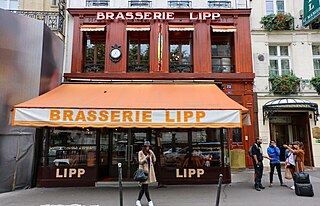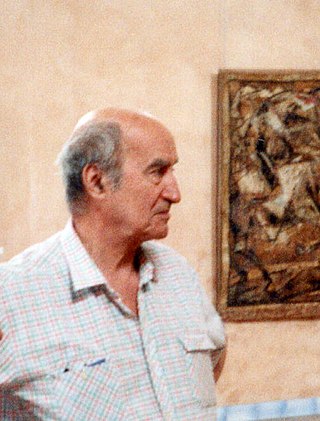
The Prix Théophraste-Renaudot or Prix Renaudot is a French literary award.
Louis Pauwels was a French journalist and writer.

Jules Roy was a French writer. "Prolific and polemical" Roy, born an Algerian pied noir and sent to a Roman Catholic seminary, used his experiences in the French colony and during his service in the Royal Air Force during the Second World War as inspiration for a number of his works. He began writing in 1946, while still serving in the military, and continued to publish fiction and historical works after his resignation in 1953 in protest of the First Indochina War. He was an outspoken critic of French colonialism and the Algerian War of Independence and later civil war, as well as a strongly religious man.
The Prix Maurice Genevoix is an annual French literary award made in honor of its namesake Maurice Genevoix (1890–1980). It is intended to recognize a French literary work which, by its topic or style, honors the memory and work of Maurice Genevoix. The prize was founded in 1985 in the city of Garches under the initiative of mayor Yves Bodin, who was a family friend of Genevoix. In 2004 the award was officially established at the Académie française as a "Grand Prix", meaning the winner receives a silver-gilt medal and variable cash amount, thus increasing its prestige and importance since 2004.
The Prix Méditerranée is a French literary award. It was created in 1984 in Perpignan by the Mediterranean Centre of Literature (CML) to promote cultural interaction among the numerous countries surrounding the Mediterranean Sea. Two awards are handed out every year, the Prix Méditerranée itself and the Prix Méditerranée Étranger. The latter is given to a writer from the Mediterranean basin whose original work has been translated into French.

The Grand prix des lectrices de Elle is a French literary prize awarded by readers of Elle magazine.
The Roger Nimier Prize is a French literature award. It is supposed to go to "a young author whose spirit is in line with the literary works of Roger Nimier". Nimier (1925–1962) was a novelist and a leading member of the Hussards movement. The prize was established in 1963 at the initiative of André Parinaud and Denis Huisman and is handed out annually during the second half of May. It comes with a sum of 5000 euro.

Brasserie Lipp is a brasserie located at 151 Boulevard Saint-Germain in the 6th arrondissement of Paris. It sponsors an annual literary prize, the Prix Cazes, named for a previous owner.
The Prix Maison de la Presse is an annual French literary prize, established in 1970 by the Syndicat national des dépositaires de presse (SNDP) and Gabriel Cantin. Until 2005 it was known as Prix des Maisons de la Presse and given out in the two categories Novel (Roman) and Non-Fiction (Document), after which the name was changed and the categories merged into one.

Rama Ayalon is an Israeli French-to-Hebrew translator. She has translated more than 100 books of classic and contemporary literature in the fields of prose, philosophy, and psychoanalysis. Her translations include important philosophical works such as Pensées by Blaise Pascal and Totalité et infini by Emmanuel Lévinas. Among the prose authors she has translated are Michel Houellebecq, Georges Simenon, Marguerite Duras, Guy de Maupassant, Romain Gary, Milan Kundera, Delphine de Vigan, and Leïla Slimani.
The prix littéraire de la vocation is a literary prize. Established in 1976 by the fondation Marcel-Bleustein-Blanchet pour la vocation, it is intended to help a young French-speaking novelists aged 18 to 30 years.
The Prix Jean-Freustié is a French literary prize created in 1987 by Christiane Teurlay-Freustié, second wife of writer and publisher Jean Freustie (1914–1983) to which it pays tribute, and his friends Nicole and Frédéric Vitoux as well as writer Bernard Frank. It rewards a French-speaking writer for a prose work: a novel, short story, autobiography, biography or essay. The prize is awarded annually.
The prix Contrepoint is a French literary award established in 1971 by a group of young French novelists and journalists. Each year a French-speaking novelist is selected.
The Prix France Télévisions are annual literary awards in France. Since 1995, the national television broadcaster France Télévisions has awarded two prizes, for a novel and an essay. The judging panel consists of 15 television viewers chosen from across France, on the basis of their cover letters.
The grand prix de littérature de la SGDL is a French literary prize created by the Société des gens de lettres in 1947 in order to reward an author for the whole of his work, and which is given during the spring session of the society.
The Prix Emmanuel Roblès, readers's prize of Blois, is a French literary award established in 1990 whose aim is to reward an author of first novel. It is baptized as a tribute to writer Emmanuel Robles.
Pierre Moustiers is the pen name of French writer Pierre Rossi.
Jacques Bens was a French writer and poet.

Camille Bourniquel was a French poet, novelist and painter.
The Prix Montaigne de Bordeaux is a literary prize created in 2003 by the Bordeaux Wine Academy and the city of Bordeaux. It is attributed to a work that represents the values of humanism, tolerance and liberty that were dear to writer and philosopher Michel de Montaigne, who was Bordeaux's mayor from 1581 to 1585.





